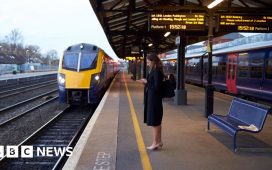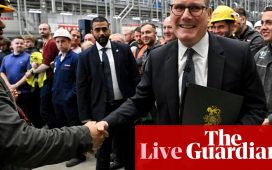Jonathan Reynolds, business secretary, defends government’s decision over winter fuel allowance payments
Good morning. Today will be a difficult day for the Labour party, which is asking its MPs to vote this afternoon to means-test the winter fuel payment, but it is important to keep a sense of proportion, and a good indicator of that is the way lobby journalists are having to redefine the word “rebel”. In the Tory Brexit days, and before, a rebel was an MP voting against their government. But today very, very few Labour MPs are expected to do that (the unusually harsh sanctions imposed on the seven Labour backbenchers who voted against the king’s speech have not gone unnoticed), and reporters on rebel count today will largely being trying to work out how many Labour MPs are deliberately abstaining.
Jonathan Reynolds, the business secretary, has been doing a media round this morning defending the government’s decision. Speaking on Sky News this morning, he claimed the government had “no choice”. He told the programme:
We have no choice … The nature of what we’ve inherited and the challenges that that presented required some immediate decisions.
It is clear what he meant (he was blaming the decision on the budget legacy left by the Tories), but “no choice” is not technically right, and it clashes with the language Rachel Reeves, the chancellor, is using in a Daily Telegraph article today about the move. She describes it as the “right choice”. She explains:
This Labour government was elected on a clear mandate of change. That change can only happen by fixing the foundations of our economy. That is why economic stability was the first step in our manifesto, because I know, like every family and business knows, prosperity can only happen on the bedrock of strong public finances.
Delivering that change means difficult decisions, including cancelling road projects that were not properly funded, reviewing the new hospital programme to deliver a realistic plan, and targeting winter fuel payments to the most in need. These were not choices I wanted to make nor expected to make, but they were the right choice to deliver our promise of economic stability. And with that stability we can deliver a Britain that is better off. That is what drives my politics and the decisions I take in government every single day.
I will post more from Reynolds’ interview round shortly.
The vote on winter fuel payments will come at around 2pm, or later if there are urgent questions or statements in the Commons. There is another vote this afternoon which is far less consequential, and perhaps irrelevant to most pensioners, but of some interest to those of us following the Tory leadership contest. And Keir Starmer is speaking to the TUC this morning, so it’s a busy news day.
Here is the agenda.
11am: Keir Starmer speaks at the TUC conference.
11.30am: Shabana Mahmood, the justice secretary, takes questions in the Commons.
11.30am: Downing Street holds a lobby briefing.
Noon: David Lammy, the foreign secretary, holds a press conference with Antony Blinken, the US secretary of state, who is visiting London.
After 12.30pm: MPs begin the debate on means-testing the winter fuel payment. The debate will last 90 minutes, with the vote immediately afterwards.
2.30pm: Tim Davie, the BBC director general, and Samir Shah, the BBC chair, give evidence to the Lords communications and digital committee.
5pm: The results of the second round of voting in the Tory leadership contest are due to be announced.
If you want to contact me, please post a message below the line (BTL) or message me on social media. I can’t read all the messages BTL, but if you put “Andrew” in a message aimed at me, I am more likely to see it because I search for posts containing that word.
If you want to flag something up urgently, it is best to use social media. I’m still using X and I’ll see something addressed to @AndrewSparrow very quickly. I’m also trying Bluesky (@andrewsparrowgdn) and Threads (@andrewsparrowtheguardian).
I find it very helpful when readers point out mistakes, even minor typos (no error is too small to correct). And I find your questions very interesting too. I can’t promise to reply to them all, but I will try to reply to as many as I can, either BTL or sometimes in the blog.
Key events
State pension set to rise by 4% next year under triple lock after ONS publishes Q2 earnings figures
This morning the Office for National Statistics has published a slew of labour market figures, including the figures showing the rate at which average earnings rose in the three months to July (Q2, the second quarter of the year). This is the figure that will be used to set the state pension increase next year, because under the triple lock the rise is indexed to earnings, prices or 2.5%, whichever is highest, and this year the earnings figure is the highest.
Graeme Wearden has more on the business live blog. He explains:
The latest UK labour market statistics, just released, show that total pay (including bonuses) rose by 4% in the May-July quarter.
And under the UK’s triple-lock pension pledge, that indicates that the new state pension should also rise by 4% next year.
That would lift the new state pension – currently £221.20 per week – up to around £230 per week, an increase of almost £9 a week from next April.
On an annual basis, it would increase the new state pension from £11,502.40 per year to £11,962 per year, an increase of £460 a year.
The final decision on the state pension will be taken by the secretary of state for work and pensions, Liz Kendall, before October’s budget. But chancellor Rachel Reeves has already pledged the government’s backing of the triple lock until the end of this parliament.
The Telegraph has headlined this as “State pension to rise by just £8.85 per week”, which is a good example of a ‘glass half empty’ take, but which also illustrates the extent to which pensioners are doing a lot better than they were in 1999, when the weekly pension went up by just 75p per week.
Rachel Reeves, the chancellor, has argued that the penion increases delivered by the triple lock are one reason why it’s acceptable to remove the winter fuel allowance (worth up to £300 per household) from most pensioners. In her Telegraph article today, she says:
We are delivering our manifesto promise to protect the triple lock, so we can put more money in pensioners’ pockets each and every year. The full state pension alone will be worth around £1,700 more by the time of the next election.
Jonathan Reynolds, business secretary, defends government’s decision over winter fuel allowance payments
Good morning. Today will be a difficult day for the Labour party, which is asking its MPs to vote this afternoon to means-test the winter fuel payment, but it is important to keep a sense of proportion, and a good indicator of that is the way lobby journalists are having to redefine the word “rebel”. In the Tory Brexit days, and before, a rebel was an MP voting against their government. But today very, very few Labour MPs are expected to do that (the unusually harsh sanctions imposed on the seven Labour backbenchers who voted against the king’s speech have not gone unnoticed), and reporters on rebel count today will largely being trying to work out how many Labour MPs are deliberately abstaining.
Jonathan Reynolds, the business secretary, has been doing a media round this morning defending the government’s decision. Speaking on Sky News this morning, he claimed the government had “no choice”. He told the programme:
We have no choice … The nature of what we’ve inherited and the challenges that that presented required some immediate decisions.
It is clear what he meant (he was blaming the decision on the budget legacy left by the Tories), but “no choice” is not technically right, and it clashes with the language Rachel Reeves, the chancellor, is using in a Daily Telegraph article today about the move. She describes it as the “right choice”. She explains:
This Labour government was elected on a clear mandate of change. That change can only happen by fixing the foundations of our economy. That is why economic stability was the first step in our manifesto, because I know, like every family and business knows, prosperity can only happen on the bedrock of strong public finances.
Delivering that change means difficult decisions, including cancelling road projects that were not properly funded, reviewing the new hospital programme to deliver a realistic plan, and targeting winter fuel payments to the most in need. These were not choices I wanted to make nor expected to make, but they were the right choice to deliver our promise of economic stability. And with that stability we can deliver a Britain that is better off. That is what drives my politics and the decisions I take in government every single day.
I will post more from Reynolds’ interview round shortly.
The vote on winter fuel payments will come at around 2pm, or later if there are urgent questions or statements in the Commons. There is another vote this afternoon which is far less consequential, and perhaps irrelevant to most pensioners, but of some interest to those of us following the Tory leadership contest. And Keir Starmer is speaking to the TUC this morning, so it’s a busy news day.
Here is the agenda.
11am: Keir Starmer speaks at the TUC conference.
11.30am: Shabana Mahmood, the justice secretary, takes questions in the Commons.
11.30am: Downing Street holds a lobby briefing.
Noon: David Lammy, the foreign secretary, holds a press conference with Antony Blinken, the US secretary of state, who is visiting London.
After 12.30pm: MPs begin the debate on means-testing the winter fuel payment. The debate will last 90 minutes, with the vote immediately afterwards.
2.30pm: Tim Davie, the BBC director general, and Samir Shah, the BBC chair, give evidence to the Lords communications and digital committee.
5pm: The results of the second round of voting in the Tory leadership contest are due to be announced.
If you want to contact me, please post a message below the line (BTL) or message me on social media. I can’t read all the messages BTL, but if you put “Andrew” in a message aimed at me, I am more likely to see it because I search for posts containing that word.
If you want to flag something up urgently, it is best to use social media. I’m still using X and I’ll see something addressed to @AndrewSparrow very quickly. I’m also trying Bluesky (@andrewsparrowgdn) and Threads (@andrewsparrowtheguardian).
I find it very helpful when readers point out mistakes, even minor typos (no error is too small to correct). And I find your questions very interesting too. I can’t promise to reply to them all, but I will try to reply to as many as I can, either BTL or sometimes in the blog.











